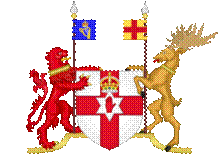Northern Ireland. The coat of arms granted in 1924 to the then Government of Northern Ireland, used officially until that government's abolition in 1973
Main article: History of Northern Ireland
The coat of arms granted in 1924 to the then Government of Northern Ireland, used officially until that government's abolition in 1973 As expected, the Parliament of Northern Ireland resolved on 7 December 1922 (the day after the establishment of the Irish Free State) to make the following address to the King to exercise, within the one month allowed, the right to opt out of the Irish Free State: "Most Gracious Sovereign, We, your Majesty's most dutiful and loyal subjects, the Senators and Commons of Northern Ireland in Parliament assembled, having learnt of the passing of the Irish Free State Constitution Act 1922, being the Act of Parliament for the ratification of the Articles of Agreement for a Treaty between Great Britain and Ireland, do, by this humble Address, pray your Majesty that the powers of the Parliament and Government of the Irish Free State shall no longer extend to Northern Ireland";.[20][21] Shortly afterwards, a commission was established to decide on the territorial boundaries between the Irish Free State and Northern Ireland. Owing to the outbreak of civil war in the Free State, the work of the commission was delayed until 1925. Leaders in Dublin expected a substantial reduction in the territory of Northern Ireland, with nationalist areas moving to the Free State. However the commission's report recommended only that some small portions of land should be ceded from the Free State to Northern Ireland. To prevent argument, this report was suppressed and, in exchange for a waiver to the Free State's obligations to the UK's public debt and the dissolution of the Council of Ireland (sought by the Government of Northern Ireland), the initial six-county border was maintained with minor changes. In June 1940, to encourage the neutral Irish state to join with the Allies, British Prime Minister Winston Churchill indicated to the Taoiseach Éamon de Valera that the United Kingdom would push for Irish unity, but believing that Churchill could not deliver, de Valera declined the offer.[22] (The British did not inform the Government of Northern Ireland that they had made the offer to the Dublin government, and De Valera's rejection was not publicised until 1970). The Ireland Act 1949 gave the first legal guarantee to the Parliament and Government of Northern Ireland that the region would not cease to be part of the United Kingdom without the consent of the majority of its citizens.
|





